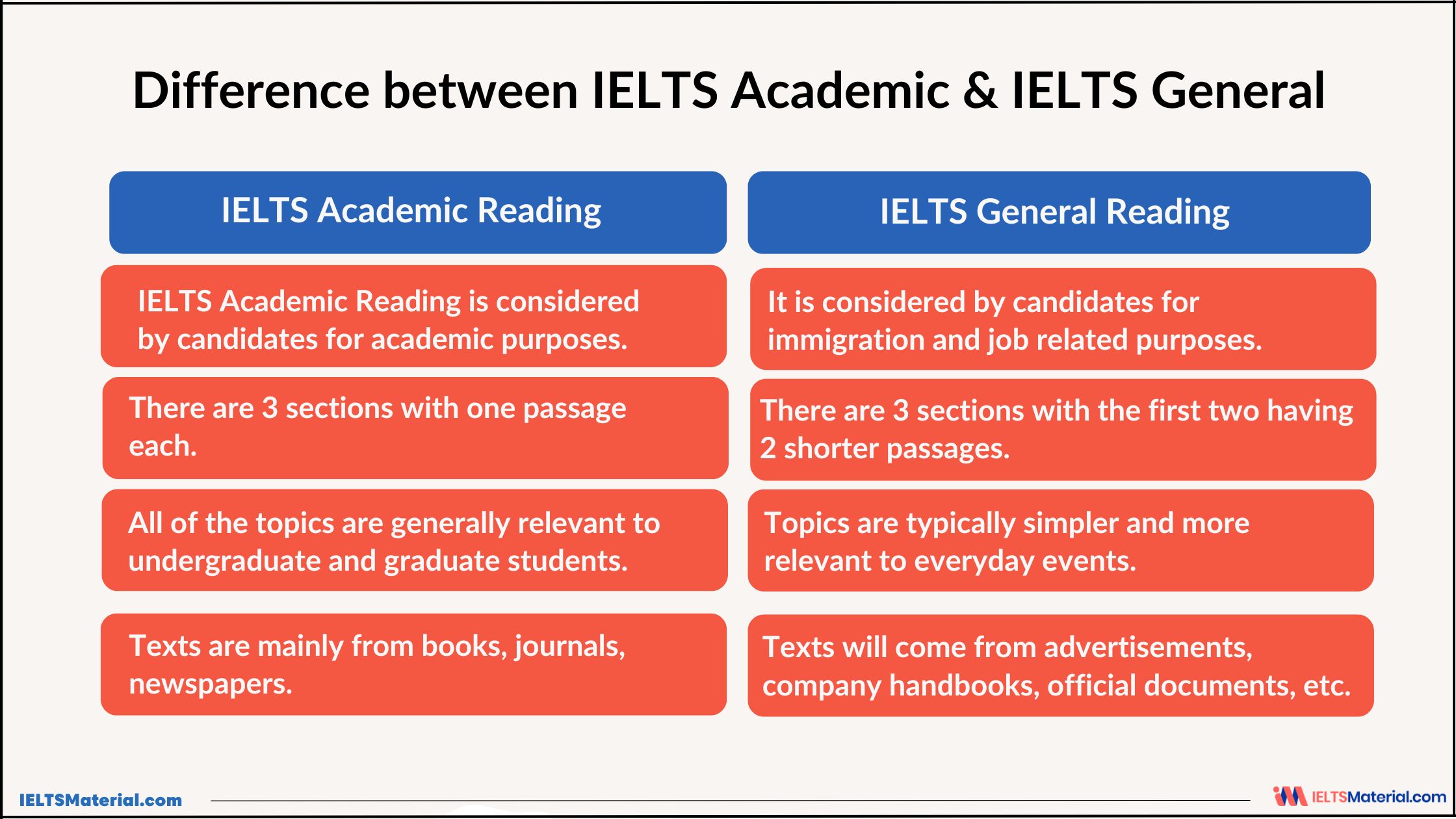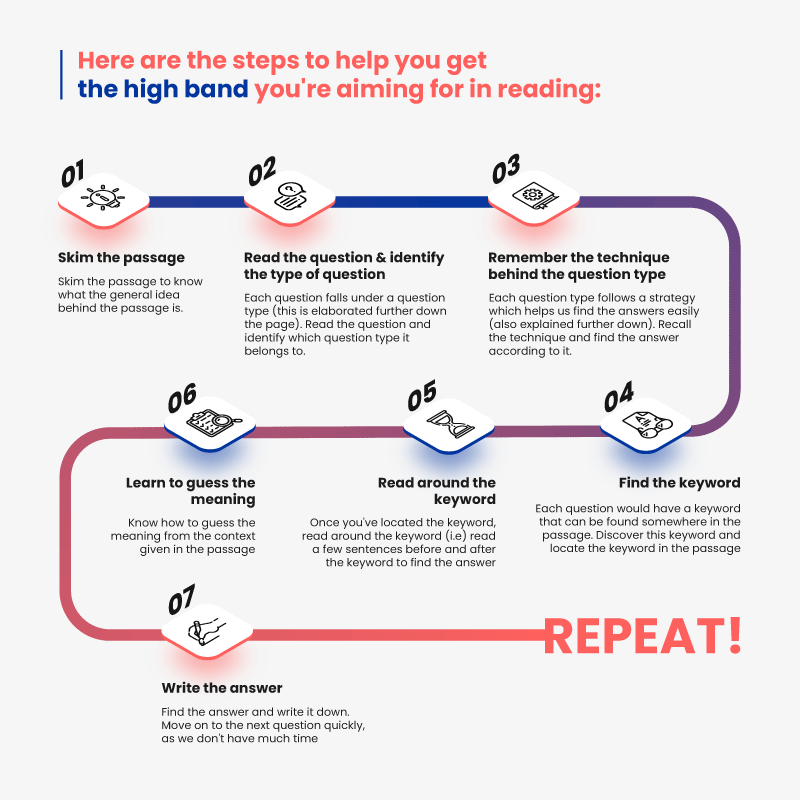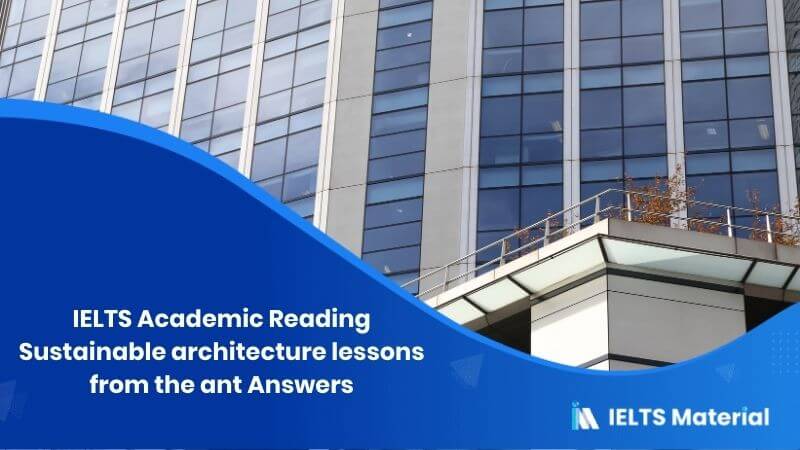IELTS Reading
-
Copy link
Limited-Time Offer : Access a FREE 10-Day IELTS Study Plan!
“Familiarize yourself with every aspect of the IELTS Reading exam and master the tips and techniques shared in this blog to achieve the top reading band score!“
Whether you're aiming for the Academic or General Training module, excelling in the IELTS Reading section is pivotal in achieving your desired band score. To do so, you have to acquaint yourself with every tidbit of information on the IELTS Reading exam and get your hands on IELTS reading materials for Academic Reading and IELTS General Training Reading. In this blog, we'll delve into the specifics of the IELTS Reading test, explore its format, question types, and provide valuable tips and techniques to avoid mistakes and help you succeed.
Understanding IELTS Reading Format
The IELTS Reading test is designed to evaluate your reading skills. Therefore, you must demonstrate your ability to understand and evaluate the provided passages.
- It comprises 3 sections, with a total of 40 questions.
- The duration of the exam is 60 minutes and to complete the test within the stipulated time, you're advised not to spend more than 20 minutes on each passage.
- Each of the 40 questions carries 1 point, and no negative marking for wrong answers.
- The Reading module of IELTS is different for IELTS Academic and General Training exams. Even though the time, question types and number of questions given for both the sections remain the same, these sections do differ according to the tests taken.
- The questions fall under different question types like MCQs, Matching Questions, True/False/Not Given, Completion questions, etc. Each of these types is explained elaborately further down the page.
Difference between IELTS Academic & IELTS General
As aforementioned, there are some differences between IELTS Academic Reading and the Reading module of IELTS General. 
- The IELTS Academic Reading section is divided into 3 parts, with each of these parts consisting of a long paragraph text. The difficulty level increases from part 1 to part 3. The IELTS General Training section is also divided into three parts. Part 1 and 2 of this section will have one or two texts and Part 3 will contain a long, difficult passage on a general topic of interest.
- The texts in Academic Reading are usually related to subjects like science, sociology and can even be some form of illustration. However, in General Training Reading, Part 1 has texts related to everyday life, courses or some kind of service provided and Part 2 has texts related to jobs, application procedures, etc.
- As the IELTS General Reading section is easier than the IELTS Academic Reading section, the scores vary accordingly too. More questions need to be answered correctly on a General Training section to receive the same grade as an Academic Reading section.
IELTS Reading Question Types
There are different kinds of questions for each of the passages that appear in the IELTS reading examination.
-
Multiple Choice Questions
IELTS reading multiple choice questions have about 3-4 options from which we have to choose our answer. This might be in the form of a question & answer type or a choose a correct ending to a sentence type. These answers appear in chronological order according to the passage. Here is a sample of a multiple-choice question:
-
True/False/Not Given Questions
True/False/Not Given IELTS Reading questions are very tricky. They consists of several statements:
- If the statement is present in the article as it is then you need to mark it as true.
- If the statement is found to be the opposite of the sentence which is there then it should be marked as false.
- If the statement given in the question is not at all present in the article then it should be marked as not given. Do not spend a lot of time finding the sentence which is not there.
-
Yes/No/Not given Questions
Similar to the True/False/Not given questions, IELTS Reading Yes/No/Not Given also have various statements. But here you are asked to agree or disagree with the statement based on the opinion of the author.
-
Matching Questions
There are various types of matching questions in IELTS reading tests and each one is different from another.
-
Matching Headings:
In IELTS Reading Matching Headings to Paragraph question, a list of headings will be given and you are asked to match these headings with a paragraph in the passage. You should read the headings before you begin reading the text. To get the correct answer, you have to read the complete paragraph and not just stop with the first few lines of the paragraph. There will also be many other headings that are not related to any of the paragraphs given in the passage, in such cases, try to identify those types of headings too.
-
Matching Information:
Matching Information IELTS Reading questions have a list which contains information taken from the paragraphs. You are asked to find out the paragraph from which the information is taken. Sometimes the question may be tricky because the information given might not be in exact words as given in the paragraph instead it will be paraphrased so you need to read the paragraph to understand the meaning/idea behind it to answer these questions.
-
Matching Features:
In IELTS Reading Matching Features question, there will be a list of items in the box and you need to match these items by reading and understanding some sentences in the passages. The list may be of the name of people or cities. For example, If there is a name of a person in the box of items then the question may be to match the sentence with the person who said them. Like other types of match questions, some of the items mentioned may not be available in the passage. So, to save time, read the passage before answering each question. Here is a sample matching features question:
-
Matching Sentence Endings:
In IELTS Reading Matching Sentence Endings question, you need to connect two halves of the sentences. The first half of the sentence will be already given and you need to find out which is the appropriate ending for the sentence from the list given. While choosing from the list you need to keep the following things in mind:
- There should not be any grammatical errors in the sentence.
- The ending sentence chosen by you should make sense
- The sentence should have the same meaning as the sentence in the passage.
-
Sentence Completion and Short-answer Questions
IELTS Reading Sentence Completion and Short-answer questions are almost similar. In sentence completion, you’ll be asked to fill in the blank spaces using the words given in the text. Whereas, in short answers, you’ll have to take words from the given text to write the short answers. It is important to pay close attention to the instructions that are given in the question because in some instructions there will be a word limit mentioned and you may lose marks if you don’t follow it.
-
Note, Table, Diagram and Summary Completion Questions
In Note, Table, IELTS Reading Summary Completion and Diagram Completion IELTS Reading questions, you will be asked to complete a set of notes, tables, diagrams or a summary based on the information given in the text. Sometimes the question will be to write a short answer and sometimes you’ll have to choose from the list of answers given. Usually, these kinds of questions will only be based on one part of the passage, so you won’t have to read the whole passage to fill in the important information.
IELTS Reading Band Score
The IELTS reading band score is calculated on the basis of the number of correct answers. Since there are a total of 40 questions, answering all of them correctly can help you score Band 9. There is a slight difference in the calculation of IELTS Academic reading band score and that of GT reading due to the slight variation in difficulty level. Therefore, you can use the IELTS Reading score table given below to calculate your IELTS Reading band score for the Academic and General training sections, respectively.
| Correct Answers for IELTS Academic Reading | Correct Answers for IELTS GT Reading | IELTS Reading Band Score |
| 40-39 | 40 | 9 |
| 38-37 | 39 | 8.5 |
| 36-35 | 38-37 | 8 |
| 34-33 | 36 | 7.5 |
| 32-30 | 35-34 | 7 |
| 29-27 | 33-32 | 6.5 |
| 26-23 | 31-30 | 6 |
| 22-19 | 29-27 | 5.5 |
| 18-15 | 26-23 | 5 |
| 14-13 | 22-19 | 4.5 |
| 12-10 | 18-15 | 4 |
| 9-8 | 14-12 | 3.5 |
| 7-6 | 11-9 | 3 |
| 5-4 | 8-6 | 2.5 |
IELTS Reading Materials
Study materials for preparing for IELTS Reading vary from reading passage for IELTS Academic and General to IELTS Reading practice tests and ebooks. So, let’s have a look at all of them for a comprehensive preparation!
IELTS Reading Passage Topics
Here are some of the latest IELTS Reading topics which are more popular and also these topics have recently appeared in the IELTS exam.
- In Praise Of Amateurs IELTS Reading Answers
- The True Cost Of Food Reading Answers
- Climate Change And The Inuit Reading Answers
- Zoo Conservation Programmes Reading Answers
- A Workaholic Economy Reading Answers
- Research Using Twins Reading Answers
- The Little Ice Age Reading Answers
- What's So Funny Reading Answers
- The Scientific Method Reading Answers
- Numeration Reading Answers
- Delivering The Goods Reading Answers
- Eco Tourism Reading Answers
- Collecting Ant Specimens Reading Answers
- The Impact Of Wilderness Tourism Reading Answers
- Visual Symbols And The Blind Reading Answers
- The Dover Bronze Age Boat Reading Answers
IELTS Reading eBooks
These are the list of reading books which you can use as study material for your IELTS Reading preparation.
- Reading Skills Ebook – Jeremy Taylor & Jon Wright
- Essential Reading for IELTS
- IELTS Reading Recent Actual Tests Volume 2 (Ebook)
- Recent Actual Tests Volume 4 (Ebook)
- Recent Actual Tests Vol 5 (Ebook)
- Recent Actual Tests Vol 6 (Ebook)
- IELTS Reading Tests by Sam McCarter & Judith Ash (Ebook)
- Improve Your Skill – Reading For IELTS 6.0 – 7.5 With Answer Key ( Ebook )
- Collins Reading For IELTS by Els Van Geyte (Ebook)
Advanced Techniques for IELTS Reading
 Before we move on to the open secret of how to ace the IELTS reading section, let's get introduced to two important IELTS Reading keyword techniques.
Before we move on to the open secret of how to ace the IELTS reading section, let's get introduced to two important IELTS Reading keyword techniques.
Skimming & Scanning
Skimming is to read a text rapidly to get a general overview of the material (i.e) to know the main theme or idea behind the passage. Scanning is to read a text rapidly to find specific information such as figures, names, etc. Moving on to the next section, here are the steps to help you get the high band you're aiming for in reading:
- Skim the passage - Skim the passage to know what the general idea behind the passage is.
- Read the question and identify the type of question - Each question falls under a question type (this is elaborated further down the page). Read the question and identify which question type it belongs to.
- Remember the technique behind the question type - Each question type follows a strategy which helps us find the answers easily. Recall the technique and find the answer according to it.
- Find the keyword - Each question would have a keyword that can be found somewhere in the passage. Discover this keyword and locate the keyword in the passage.
- Read around the keyword - Once you've located the keyword, read around the keyword (i.e.) read a few sentences before and after the keyword to find the answer.
- Learn to guess the meaning - Know how to guess the meaning from the context given in the passage.
- Write the answer - Find the answer and write it down. Move on to the next question quickly, as we don't have much time.
- Repeat the same steps to answer the remaining questions.
Top Tips for Success in IELTS Reading
Preparation for a vital exam like IELTS remains incomplete without using tips to solve the questions efficiently within the time limit. So, given below are some important tips to master this IELTS module and achieve a top band score.
- You can prepare for your IELTS reading test by reading English texts such as newspapers, books or journals regularly. This will help you improve your vocabulary as well as your grammar.
- You can start practising by reading IELTS reading materials and then with time, also create a habit of reading English newspapers, magazines, journals on a day-to-day basis.
- You can further prepare yourself by learning about the type of questions that could be posed in the test.
- Please check for common spellings errors in IELTS, as an incorrect spelling would be considered an incorrect answer.
- Prepare yourself in a way that you have adequate time to complete all sections without rushing and revise the answers.
- If unsure about an answer, make educated guesses rather than leaving questions blank to maximize your chances of scoring.
Common Mistakes to Avoid in IELTS Reading
In order to avoid the common errors made by most IELTS candidates, you have to know them. So, check out the list below and implement ways to dodge them effectively.
- Misinterpretation of questions: Read the instructions and questions carefully to avoid answering incorrectly because of misinterpretation.
- Disregarding instructions: Follow the instructions, especially the ones about the word limit for each question type, closely to ensure your answers align with them.
- Overlooking details: While skimming, ensure you don't miss crucial details that could be essential for accurate answers.
- Ineffective Time Management: Avoid spending disproportionate time on a single question or passage, as this could impede your ability to complete the entire section.
Success in the IELTS Reading test demands a strategic approach, consistent practice, and familiarity with the test format. By implementing the tips and techniques outlined in this guide and avoiding common pitfalls, you can enhance your confidence and performance in this critical component of the IELTS exam. Moreover, if you need any sort of guidance, feel free to interact with our IELTS experts or be a part of IELTS webinars.
Other Useful Articles
- How to complete IELTS Reading in less than 1 hour
- Useful IELTS Reading Website Resources & material for both Academic & General Training Module
- 101 IELTS Reading Past Papers With Answers PDF Download
- 15 Days’ Practice for IELTS Reading (PDF) with Answers (General And Academic)
- IELTS Listening Reading and Writing Answer Sheet
- Should You Use All Capital Letters in the IELTS Listening and Reading Tests
- Calculating General and Academic Band Scores
- Time management in IELTS Reading – A key to get a high band score
- IELTS Reading Band Score Chart: What You Need to Know
- IELTS Reading Tips And Techniques To Increase Your Reading Speed
- How to Do Short Answer Type of Questions in IELTS Reading?
Frequently Asked Questions
How many reading passages are there in the reading module of IELTS?
Is IELTS score of 7 good in reading?
How do I improve my reading skills for IELTS?
Do I have extra time at the end of the IELTS Reading module to transfer my answers to the answer paper?
Should I spend the same amount of time on each section of IELTS Reading?
Would I find all of the answers of the reading passage for IELTS in an order?
Will there be any issue if I write the answers to the IELTS Reading questions in all caps?
Will I lose points for incorrect answers in the IELTS Reading module?
What should I do if I don't understand a word or phrase in the passage?
How can I improve my score in the True/False/Not Given question type?
Practice IELTS Reading based on question types
Recent Articles

Janice Thompson

Janice Thompson

Janice Thompson


